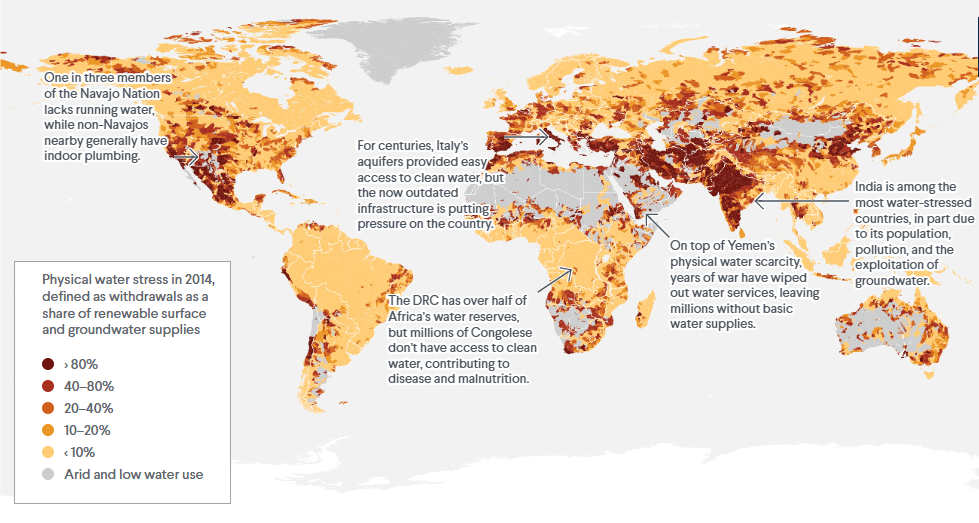Water stress affects over 2.3 billion people globally, with 733 million living in critically stressed regions. Water scarcity, driven by climate change, global warming, and overpopulation, is worsening as communities struggle with insufficient water supply and inadequate infrastructure. Water filtration, water testing, and water audits are essential for addressing these challenges.
Countries must implement sustainable solutions for transboundary waters to combat water stress and improve international cooperation. With the pressure increasing, effective water management is crucial to securing access to clean water and mitigating the impacts of climate change.

Water Scarcity
Water scarcity is categorized into physical scarcity, where ecological conditions limit water availability, and economic scarcity, caused by inadequate water infrastructure. These factors often combine, leading to significant water stress. For instance, a region may experience both insufficient rainfall and poor water storage or sanitation systems.
Human factors, such as conflict, also exacerbate the problem. A notable example is the 2022 Ukraine war, which destroyed vital water infrastructure, leaving millions without access to clean water.
Water infrastructure is key to overcoming water scarcity. Even regions facing physical scarcity, like the Southwestern USA and Oman, can provide reliable water access through strong political will and financial investment in water systems.
Climate Change and Water Stress
UN experts project 20% drop in renewable water resources with every 1°C (1.8°F) increase in global average temperature. Global warming is expected to increase water stressed areas around the globe and also further deteriorate water scarcity in already suffering regions. According to scientists, weather in tropical and subtropical regions will become much more variable with longer droughts and intense rainfall in the coming years. Agricultural activities are likely to suffer due to unpredictable rainfall and rising temperatures. Due to this, communities can also face food security issues including acute and chronic hunger. Erratic climate is expected to bring more floods that can destroy vital crop and overwhelm storage systems. In addition to this sediments sept up due to rainfall runoff can further contaminate water sources and clog treatment plants.
Role of International Organizations and Governments
One of the UN Sustainable Development Goals (SDGs) is to ensure the sustainable management and availability of safe and clean water for all. Adopted in 2015, this 15-year agenda has led to significant progress between 2000 and 2017, with access to safe drinking water increasing by 10% and sanitation services improving by 17%. Governments, in collaboration with partner organizations, are taking innovative steps to improve water security and ensure equitable water access in the coming years, focusing on sustainable practices and enhanced infrastructure.
Wastewater Recycling:
More cities around the world are recycling their sewage wastewater into drinking water. One such example is the desert capital of Namibia which has been recycling its municipal wastewater into drinking water for over a decade.
Green infrastructure:
This approach involves plants, soil, and other natural systems for the management of storm water. Water utilities in Peru are mandated to reinvest a part of their profit in green infrastructure. Vietnam is also taking similar actions of integrating natural and traditional built water infrastructure.
Smart agriculture/ incorporation of Artificial Intelligence:
China has been leading the way in bioengineering of crops in order to make them more resilient and productive.
World Water Day (WWD)
World Water day is held on 22nd of March ever since the year 1993 to celebrate the importance of water and raise awareness of the 2 billion people living without access to safe and clean water and sanitation services. Water is the driving force behind every aspect of life. It save lives by alleviating poverty, reduces the outbreak of diseases and improves economic growth. Water has to be treated as a scarce resource. There is a crucial need for integrated water resource management in order to balance the needs of communities and economy especially in the time of water scarcity.
World Water Day : A day to celebrate the essence of life, reflect on global water challenges, and unite in the pursuit of sustainable water management for a healthier and more resilient future. World Water Day: An annual observance to raise awareness about the importance of freshwater, promote sustainable water management, and advocate for access to clean water for all.
Water care striving and contributing, water conservation and reuse. Our focus is water positive (+ ) and carbon Negative ( – ). Our ongoing projects are to treat industrial waste and reuse in agriculture with no sludge and minimal energy
